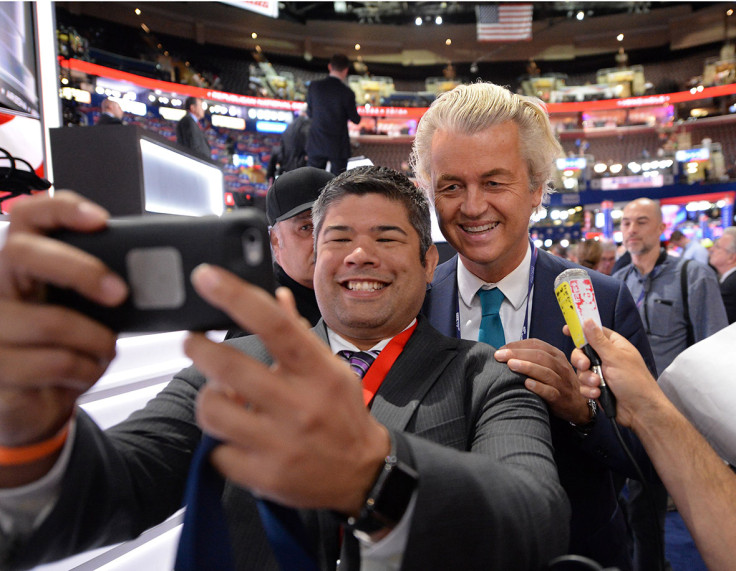Geert Wilders: How a Dutch kibbutzim brought anti-Islam rhetoric into the mainstream
Wilders' radical message dates back to his time in Israel as a teenager.

It has become common to talk about Geert Wilders as the 'Dutch Donald Trump' but it would actually be fairer to refer to the US president as the 'American Geert Wilders'. Trump caught the attention of the world when he made anti-Islam rhetoric his election platform, but for Wilders attacking Muslims has been his life's work.
Wilders began his political career as a speech-writer before becoming a councillor in the mid-1990s. Originally a member of the ruling VVD (People's Party for Freedom and Democracy), he split with the centre right party in protest for its support of Turkey joining the EU and founded his own Party for Freedom (PVV) in 2004.
Back then the Dutch anti-immigration right was dominated by Pim Fortuyn, who rose to international prominence before he was assassinated during the 2002 elections. In 2004 a young Dutch film-maker, Theo Van Gogh, was shot dead in the street by a Dutch-Moroccan after making a film – Submission – that was critical of Islam.
A week later, Dutch special forces arrested two suspected terrorists after a 14-hour standoff in an immigrant neighbourhood in the Hague. The men had planned to murder Wilders and the former Dutch MP and author Ayaan Hirsi Ali, who had worked with Van Gogh on Submission. Wilders has been under police protection ever since.
Who is Geert Wilders?
Age: 53
Political party: Party for Freedom
Hometown: Venlo
In 2008, Wilders commissioned an anti-Islam film of his own – Fitna – which the following year he took on a 'world tour', eventually holding a screening in the US Congress, which was attended by just 40 American Congressmen. He was prevented from showing the film in the UK due to a travel ban.
But Wilders' opinions on Islam – he has called for the banning of Sharia law comparing the Quran to Mein Kampf – predates both his political career and the threats to his life. As a teenager in the 1980s he spent time on a kibbutz in Israel and has been a staunch defender of the Israeli state ever since. He caused outrage in 2010 by saying that Jordan should be renamed Palestine and it should be an alternative homeland for Arabs in Israel.
"He has not said a lot about his experiences in Israel, so we don't know exactly where he was or what he experienced there, but he often refers to it as a very informative experience for him," said Sarah de Lange, from the Department of Political Science at the University of Amsterdam.
He shares that kinship with Israel with his American doppelgänger, Donald Trump, who recently suggested that the US abandon its commitment to the two state solution and move its embassy to Jerusalem. Wilders has also called for the Netherland to move its embassy to Jerusalem, which both Palestinians and Israelis claim as their capital.
But just as Wilders' views on Israel date back some three decades – unlike Trump's, which often seem to have been made on the hoof – so his political strategy is more sophisticated than that of the US president. Wilders has used social media to galvanise support, but chosen calculated statements of propaganda rather than late-night, semi-illiterate Twitter rants.
"Wilders is very, very strategic about every practical move he makes whether it is a social media communication, communication with journalists from the press, public broadcasters," said de Lange.
In 2014, Wilders miscalculated how much Dutch liberalism would forgive of him during a speech to a rally in the Hague. While on stage he asked his supporters whether they wanted more or fewer Moroccans in the Netherlands, to which they chanted: 'Fewer! Fewer!'. Wilders smiled and promised: 'Then we will arrange that'.
For those comments he was eventually found guilty of discrimination in December 2016, although the courts imposed no punishment. Wilders boycotted most of the trial but pledged to appeal the ruling: "I will continue to speak the truth [...] about the Moroccan problem, and no judge, politician or 'terrorist' will stop me," he vowed.
In the past Wilders has attempted to couch his attacks on Islam and immigrants in the guise of concern for liberal democracy and free speech, enabling him to win support from those who would not usually consider voting for a politician who wants to close down mosques or ban Shariah law.
But 'America's Geert Wilders' has shown that brazen anti-Islam rhetoric can put a politician in the White House and while the 'Dutch Donald Trump' is constrained by the Netherland's coalition-based politics – and the reluctance of both major parties to work with him – the US election has changed the nature of the game. Even if he will never leave Holland, Wilders will likely play a pivotal role in its future for some time to come.
© Copyright IBTimes 2024. All rights reserved.






